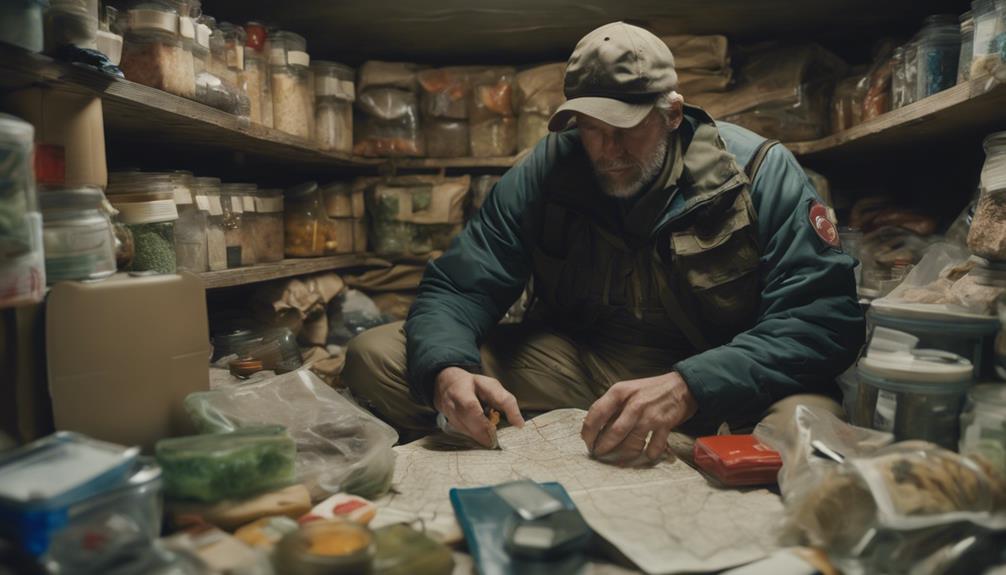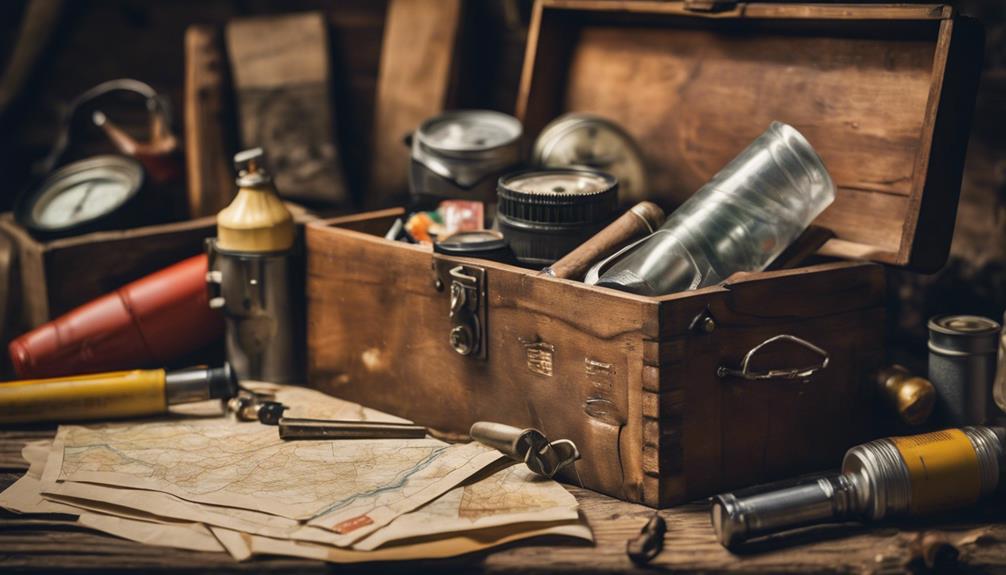The preppers show craze uncovers a community dedicated to self-sufficiency and debunking myths about their prepared lifestyle. Prepping origins trace back to Cold War civil defense and evolved to encompass various emergencies. Preppers prioritize readiness for unexpected events, not just Doomsday scenarios. Essential supplies like dehydrated foods and first aid kits are vital. Collaborative communities offer support, share survival tips, and enhance skills. Embracing diversity within prepper groups dispels misconceptions. Prepping for natural disasters involves preparing emergency kits, evacuation plans, and practicing drills. Stay tuned to learn more about preppers and their reality.
Key Takeaways
- Prepper shows highlight practical preparedness, not extreme scenarios.
- Showcase self-sufficiency, adaptability, and diverse prepping approaches.
- Emphasize community support, shared knowledge, and collaborative spirit.
- Provide insights on essential supplies, gear, and skills for readiness.
- Offer a realistic view of prepping beyond common misconceptions.
The Origins of Prepping
How did prepping as it's understood today originate?
Prepping has its roots in Cold War era civil defense programs, where individuals and communities prepared for potential nuclear attacks. The 1970s saw a rise in survivalism due to economic and political uncertainties, leading to an increased focus on self-sufficiency and emergency readiness.
The term 'Prepper' emerged in the early 2000s, emphasizing individual preparedness for various crises and disasters.
Preppers encompass a wide range of skills, from first aid and food preservation to off-grid living techniques. The core principles of prepping include self-reliance, sustainability, and the ability to adapt to different emergency situations.
Preppers prioritize being ready for anything, from natural disasters to societal breakdowns, by stockpiling essentials, honing survival skills, and building resilient communities.
Common Prepper Misconceptions

Many misconceptions surround Preppers, often portraying them as extreme Doomsday believers, but their motivations and practices are more diverse than commonly thought.
Not all Preppers are solely focused on Doomsday scenarios; they prepare for a wide range of emergencies. The core motivation for Preppers is readiness and being prepared for unexpected situations. Preppers come from various backgrounds and have different reasons for engaging in preparedness.
Prepping is fundamentally about self-sufficiency and the ability to handle challenging situations effectively. While there are Doomsday Preppers who prepare for catastrophic events, many Preppers focus on everyday emergencies like natural disasters or power outages.
It's essential to recognize that Preppers aren't a monolithic group; they vary in their beliefs, motivations, and practices. Understanding the diverse nature of Prepping can help dispel common misconceptions and shed light on the practicality and importance of being prepared for unforeseen circumstances.
Essential Prepping Supplies to Have

When preparing for emergencies, remember to stock up on essential supplies. This includes dehydrated foods with long shelf lives, water purification tools, and first aid kits for medical emergencies.
Don't forget to include basic survival gear as well. Items like flashlights, batteries, and multi-tools are essential for various tasks. Having these items on hand can help you stay safe and prepared during unexpected situations.
Basic Survival Gear
Make sure you have these essential prepping supplies – a first aid kit, water purification tablets, a multi-tool, and a flashlight – as part of your basic survival gear. In the prepper movement, these items are vital for being prepared in emergencies, natural disasters, or survival situations.
A good quality backpack is also essential to carry these items efficiently, allowing for mobility and organization. Preppers prioritize lightweight, durable, and multi-functional gear to guarantee practicality in various scenarios.
Having the right gear can greatly impact your ability to survive and thrive when faced with unexpected challenges. Remember, it's not just about having these items but also knowing how to use them effectively.
Investing in quality gear and familiarizing yourself with its functions can make a world of difference in times of need. Stay prepared, stay informed, and stay safe with your basic survival gear.
Emergency Food Storage
Make sure you have a reliable supply of emergency food storage, consisting of dehydrated foods with extended shelf lives for long-term sustenance in survival situations.
Dehydrated foods like fruits, vegetables, meats, and beans can last up to 25 years, making them ideal for long-term storage during emergencies. These foods only require water for rehydration, providing a convenient solution for quick meal preparation when facing crises.
It's vital to stock up on these items to guarantee you have access to necessary sustenance in challenging times. Survival stores offer a variety of dehydrated options, giving you the opportunity to prepare for different scenarios effectively.
By having a well-stocked emergency food supply, you can maintain self-sufficiency and readiness for whatever comes your way. Remember to check expiration dates regularly and rotate your supply to keep it fresh and reliable.
Don't wait until it's too late; start building your emergency food storage today, even if you begin with items from your local grocery store.
Prepper Communities and Networking

Prepper communities and networking play an essential role in fostering support and sharing important information among individuals preparing for emergencies. Being part of a group of like-minded people can offer a sense of camaraderie and assistance in times of need. These communities provide a platform for Preppers to exchange tips on survival skills, recommend gear, and discuss emergency preparedness strategies.
Online forums, social media groups, and local meetups are common avenues for connecting with other Preppers. Through networking, individuals can learn from each other's experiences, gaining valuable insights into preparedness techniques.
Moreover, community events and workshops offer opportunities for Preppers to enhance their skills and expand their knowledge base. By participating in these activities, individuals can build relationships with others who share their mindset and are equally committed to being prepared for unforeseen circumstances. Overall, the collaborative nature of Prepper communities and networking proves invaluable in the journey towards readiness for emergencies.
Prepping for Natural Disasters

Being ready for natural disasters such as hurricanes, earthquakes, and wildfires involves preparing emergency supplies, evacuation plans, and practicing drills for swift responses.
When prepping for natural disasters, it's vital to take care of yourself and your loved ones by ensuring you have enough food, water, first aid kits, and communication devices to last for several days.
Developing evacuation plans is important for safely leaving dangerous areas, and practicing drills can help you react quickly when faced with a real emergency.
Debunking Prepper Stereotypes

Often misunderstood, the reality of prepping goes beyond common stereotypes to encompass a diverse community of individuals focused on emergency readiness. Preppers aren't just preparing for Doomsday scenarios; they're gearing up for a wide range of potential emergencies, including natural disasters, power outages, or economic crises.
Research indicates a significant increase in the number of Preppers from various backgrounds, highlighting the growing importance of readiness in today's uncertain world.
It is essential to make sure that the core motivation for Preppers is being prepared for emergencies, emphasizing self-sufficiency and readiness in challenging situations. Contrary to the stereotype of extreme hoarding or isolation, Preppers often value community support and cooperation in times of need.
Frequently Asked Questions
What Is the Psychology Behind Preppers?
Understanding the psychology behind preppers involves recognizing their desire for readiness in uncertain times. Motivated by recent events and personal experiences, preppers believe in being prepared for various scenarios, not just Doomsday scenarios, stocking essentials for long-term survival.
What Percentage of Americans Are Preppers?
Around 1% of Americans are preppers, totaling approximately 3 million individuals. This number has been growing steadily. Prepping isn't just for extreme doomsday scenarios; it encompasses preparing for a variety of emergencies.
What Is the Philosophy of Preppers?
Embrace the philosophy of preppers: prepare for the worst, hope for the best. It's about self-sufficiency during emergencies. Prioritize readiness and take proactive steps for survival and security. Be ready for various potential scenarios.
What Is the Netflix Show About Preppers?
The Netflix show about Preppers gives you an inside look at their lifestyles, preparations, and motivations. It showcases survival stores, underground bunkers, and diverse prepping strategies. The series emphasizes the importance of being prepared for emergencies. Viewers can gain valuable insights into self-sufficiency, resource management, and practical survival skills. Many consider it one of the **best survival shows on Netflix**, as it not only entertains but also educates. Whether preparing for natural disasters or global crises, the show highlights the peace of mind that comes with readiness.
Are Preppers a Subculture?
Yes, preppers are indeed a subculture. Embracing preparedness for emergencies, they share beliefs in self-reliance and survival skills. Engaging in stockpiling and building shelters, preppers form a supportive community focused on readiness and resilience.
Conclusion
To sum up, prepping isn't just a trend, but a practical way to get ready for unforeseen emergencies. According to a recent survey, over 50% of Americans have started prepping to guarantee their families' safety and well-being.
By debunking stereotypes and focusing on essential supplies and community networking, preppers are taking proactive steps to be self-reliant in times of crisis.
Stay informed, stay prepared, and stay safe.










